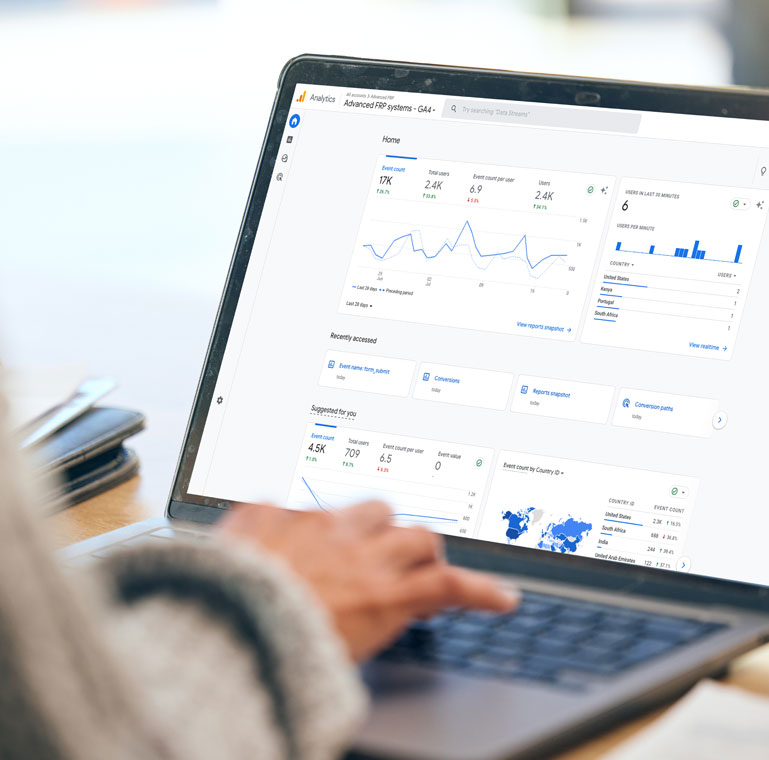Discover the Advantages, Migration Challenges and Essential Steps to Make the Most Out of GA4
On July 1, 2023, Google Analytics 4 (GA4) fully replaced Universal Analytics (UA), and standard UA properties stopped collecting data. Understanding the implication of this transition is crucial for optimizing your digital presence in this new era of analytics.
GA4’s replacement of UA will enable you to measure traffic and engagement across your websites and apps. It was built to deliver user-centric measurements by operating across platforms, not relying on cookies and using event-based data. This allows businesses to see a more unified user journey and gain new insights.
As of June 2023, more than 8.4 million websites had already switched to GA4. If yours was not one of them, there’s still time to migrate existing data so you don’t miss a beat. Since existing UA data will only be available for between six months and one year, you’ll need to download and save it as soon as possible.
In this blog, we will explore how the transition to GA4 will impact you and delve into strategies for harnessing the power of your existing UA data.
Why GA4?
Google points out that when development started on GA4, UA “was already more than 12 years old.” Websites and analytics have changed quite a bit since then, so Google Analytics needed an upgrade. Still, many marketers who are comfortable with UA have resisted switching to GA4 since it was first released in 2020 because, well, change.
Also, the inability to migrate historical UA data means making the change isn’t entirely straightforward. However, there are advantages to GA4 that will make your reporting more granular and accurate.
What Does GA4 Mean for Me?
One of the most notable changes is that event-based data replaces the current session-based data. Examples of event-based data include logging in to an application, signing up for a newsletter, making an online purchase or clicking through an email notification.
What’s the difference between event-based and session-based data?
- Events are specific single interactions that help you better understand how people engage with your business across platforms.
- Sessions are groups of user interactions with your website during a given time frame.
While UA had limited cross-device and cross-platform reporting, GA4 has full reporting in both areas, allowing you to more accurately understand where users come from, what they do and where they go.
Make the Most of GA4
To ensure a seamless transition, there are two essential steps you need to take: Migrate existing UA data and set up GA4 events.
1. Migrate existing UA data.
There are two ways to migrate existing data to GA4:
- If you have what is called Google Analytics 360, a paid product, you can export Universal Analytics data to BigQuery.
- If you don’t have Google Analytics 360, you can’t migrate data from UA to GA4 because they structure data differently.
Think about what data you want to archive and how far back you want to go.
2. Set up GA4 events.
Take a thorough look at your UA account and make a list of everything you’re tracking. Then, use the GA4 Setup Assistant in the Admin section of your GA account to create a GA4 account.
Some of the events you previously tracked in UA will transfer to GA4, but not all. In GA4, you can add missing events or include new ones. Some examples of events you may consider include page views, when a user begins the checkout process, outbound clicks to a third-party website, document downloads and when a user completes a video.
Depending on your needs, you can mark any of the events as a conversion.
Download our step-by-step instructions for saving your historical UA data and how to create an event in GA4.
Click hereTo DIY or Not
You can get an in-depth look at GA4, learn how to use it and even get GA4 certification at Google’s learning site.
It can be a bit daunting if you’re unfamiliar with GA4, so you can always call in an expert if you don’t want to do it yourself. The benefit of using a full-service marketin agency is that you don’t have to spend valuable time figuring it all out.
In addition, many businesses have difficulty understanding analytics and drawing valuable and accurate insights from the data. Agency employees have expertise that can:
- Identify additional metrics and KPIs that you should measure.
- Provide better insights that can help improve your website performance.
- Give you a better understanding of your audience.
- Spend your marketing budget more effectively.
- Improve campaign results.
We’ve covered what you need to do right now to start implementing GA4 for your (or your client’s) site and will provide additional insights in the coming months.











